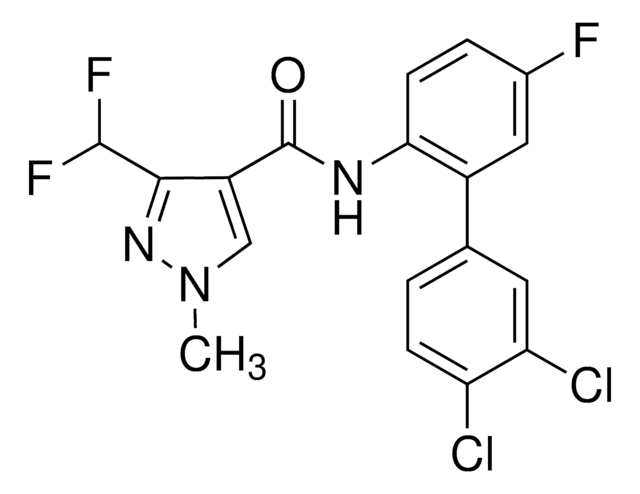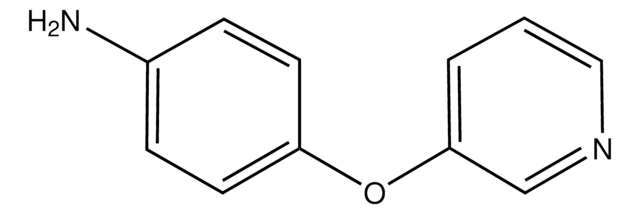CRM01345
Fluopyram
certified reference material, TraceCERT®, Manufactured by: Sigma-Aldrich Production GmbH, Switzerland
Synonyme(s) :
N-[2-[3-Chloro-5-(trifluoromethyl)-2-pyridinyl]ethyl]-2-(trifluoromethyl)benzamide, N-{2-[3-Chloro-5-(trifluoromethyl)-2-pyridyl]ethyl}-α,α,α-trifluoro-o-toluamide
About This Item
Produits recommandés
Qualité
certified reference material
TraceCERT®
Niveau de qualité
Gamme de produits
TraceCERT®
Forme
solid
Durée de conservation
limited shelf life, expiry date on the label
Fabricant/nom de marque
Manufactured by: Sigma-Aldrich Production GmbH, Switzerland
Chaîne SMILES
FC(F)(F)c1cnc(CCNC(=O)c2ccccc2C(F)(F)F)c(Cl)c1
InChI
1S/C16H11ClF6N2O/c17-12-7-9(15(18,19)20)8-25-13(12)5-6-24-14(26)10-3-1-2-4-11(10)16(21,22)23/h1-4,7-8H,5-6H2,(H,24,26)
Clé InChI
KVDJTXBXMWJJEF-UHFFFAOYSA-N
Vous recherchez des produits similaires ? Visite Guide de comparaison des produits
Description générale
Certified content by quantitative NMR incl. uncertainty and expiry date are given on the certificate.
Download your certificate at: http://www.sigma-aldrich.com
Fluopyram belongs to the class of succinate dehydrogenase inhibitor (SDHI) fungicides that are also used as a nematicide. It binds to complex II and blocks the mitochondrial electron transport chain, a fundamental component of the Krebs cycle. It is used to control grey mold, white mold (sclerotinia), and powdery mildew in crops such as table grapes, pome fruit, stone fruits, and vegetables, in addition to being used as a seed treatment for the control of nematodes. It is a broad-spectrum systemic fungicide that is absorbed by plant roots and leaves and distributed throughout the plant.
Fluopyram was approved on 1st February 2014 under the Commission Implementing Regulation (EU) No 802/20133 as per Regulation (EC) No 1107/20094 as revised by the Commission Implementing Regulations (EU) No 540/20115 and 541/201. Maximum residue levels (MRLs) for fluopyram have been set according to Reg (EU) 2021/1807 in various products of plant and animal origin from 0.01 to 60 mg/kg. Fluopyram has to be monitored in the Multiannual Control Programmes for Pesticides Residues (MACP), run within the EU and EFTA in/on products of plant origin.
Application
Fluopyram CRM may also find its use as described below:
- Method development for analyzing the succinate-dehydrogenase-inhibitor fungicide residue levels in vegetable and fruit samples by liquid chromatography-tandem mass spectrometry
- Development and validation of monoclonal antibody-based immunoassays to analyze fluopyram residues in food samples
- Simultaneous estimation of fluopyram and tebuconazole in watermelon and soil samples using QuEChERS and GC-MS based method
- Determination of fluopyram, flupyradifurone, and indaziflam in date fruit, pistachio, and soil samples by ultra-high performance liquid chromatography with tandem mass spectrometry(UHPLC-MS)
- Develop and validate a method based on QuEChERS and UHPLC-Orbitrap-MS to determine fluopyram and its metabolites in cherry tomato and cucumber
Informations légales
Mentions de danger
Conseils de prudence
Classification des risques
Aquatic Chronic 2
Code de la classe de stockage
11 - Combustible Solids
Classe de danger pour l'eau (WGK)
WGK 2
Point d'éclair (°F)
Not applicable
Point d'éclair (°C)
Not applicable
Faites votre choix parmi les versions les plus récentes :
Certificats d'analyse (COA)
Vous ne trouvez pas la bonne version ?
Si vous avez besoin d'une version particulière, vous pouvez rechercher un certificat spécifique par le numéro de lot.
Déjà en possession de ce produit ?
Retrouvez la documentation relative aux produits que vous avez récemment achetés dans la Bibliothèque de documents.
Notre équipe de scientifiques dispose d'une expérience dans tous les secteurs de la recherche, notamment en sciences de la vie, science des matériaux, synthèse chimique, chromatographie, analyse et dans de nombreux autres domaines..
Contacter notre Service technique







